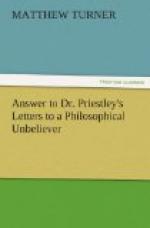The honour which Dr. Priestley gives to Helvetius, the author of that ingenious and satisfactory work intitled “The System of Nature,” does credit to his own candour. He applauds him for speaking out, he ought therefore to applaud this answer for the same reason. It is true he seems to have discovered one incongruity in the reasoning of Helvetius. The words he imputes to him are, “that nature has no object, because nature acts necessarily; man has an object; yet man also acts necessarily.” In the same way nature might have an object though it acted necessarily. But Helvetius adds, that the object which man has is a necessary object. The best defence of Helvetius (not in behalf of that passage, but of his general system) is to let him speak at large for himself; and the following quotation Dr. Priestley and the reader may accept as a specimen of the strength and justice of his argument, and as the conclusion of this answer.
“Theologians tell us, that the disorder and evil, which is seen in the world, is not absolute and real, but relatively and apparently such, and does not disprove the divine wisdom and goodness. But may not one reply, that the goodness and wonderful order which they so much extol, and on which they found their notions of those qualities in God, are in a similar way only relative and apparent. If it be only our co-existence with the causes which surround us, and our manner of perceiving them, that constitute the order of nature for us, and authorise us to attribute wisdom and goodness to the maker of what surround us, should not also our mode of existence and perception authorise us to call what is hurtful to us disorder, and to attribute impotence, ignorance, or malice, to that Being which we would suppose to actuate nature.




